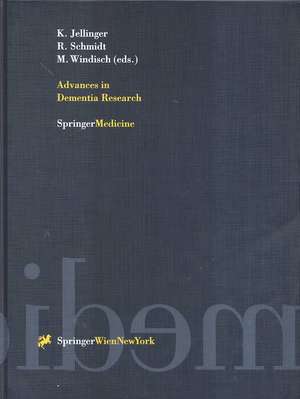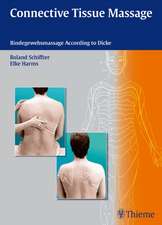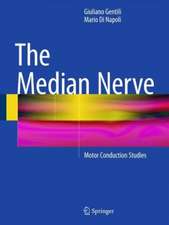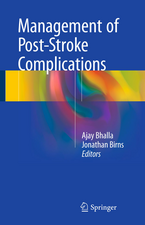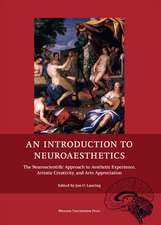Advances in Dementia Research: Journal of Neural Transmission. Supplementa, cartea 59
Editat de Kurt A. Jellinger, Reinhold Schmidt, Manfred Windischen Limba Engleză Hardback – 14 iul 2000
| Toate formatele și edițiile | Preț | Express |
|---|---|---|
| Paperback (1) | 1424.89 lei 6-8 săpt. | |
| SPRINGER VIENNA – 14 iul 2000 | 1424.89 lei 6-8 săpt. | |
| Hardback (1) | 1314.97 lei 38-44 zile | |
| SPRINGER VIENNA – 14 iul 2000 | 1314.97 lei 38-44 zile |
Din seria Journal of Neural Transmission. Supplementa
- 5%
 Preț: 1052.61 lei
Preț: 1052.61 lei - 5%
 Preț: 423.12 lei
Preț: 423.12 lei -
 Preț: 389.88 lei
Preț: 389.88 lei - 5%
 Preț: 360.86 lei
Preț: 360.86 lei - 5%
 Preț: 712.60 lei
Preț: 712.60 lei - 5%
 Preț: 365.61 lei
Preț: 365.61 lei -
 Preț: 379.68 lei
Preț: 379.68 lei - 5%
 Preț: 376.43 lei
Preț: 376.43 lei -
 Preț: 380.45 lei
Preț: 380.45 lei - 15%
 Preț: 665.73 lei
Preț: 665.73 lei - 5%
 Preț: 990.01 lei
Preț: 990.01 lei - 5%
 Preț: 368.73 lei
Preț: 368.73 lei - 5%
 Preț: 373.84 lei
Preț: 373.84 lei -
 Preț: 391.22 lei
Preț: 391.22 lei - 15%
 Preț: 643.34 lei
Preț: 643.34 lei -
 Preț: 381.59 lei
Preț: 381.59 lei - 5%
 Preț: 394.32 lei
Preț: 394.32 lei - 5%
 Preț: 374.78 lei
Preț: 374.78 lei -
 Preț: 397.97 lei
Preț: 397.97 lei - 5%
 Preț: 379.33 lei
Preț: 379.33 lei - 5%
 Preț: 364.33 lei
Preț: 364.33 lei - 5%
 Preț: 372.97 lei
Preț: 372.97 lei - 5%
 Preț: 372.19 lei
Preț: 372.19 lei - 5%
 Preț: 387.02 lei
Preț: 387.02 lei - 5%
 Preț: 1371.73 lei
Preț: 1371.73 lei - 5%
 Preț: 382.06 lei
Preț: 382.06 lei - 5%
 Preț: 367.47 lei
Preț: 367.47 lei - 5%
 Preț: 698.36 lei
Preț: 698.36 lei - 18%
 Preț: 1400.35 lei
Preț: 1400.35 lei - 5%
 Preț: 1428.71 lei
Preț: 1428.71 lei - 5%
 Preț: 1095.73 lei
Preț: 1095.73 lei - 5%
 Preț: 714.46 lei
Preț: 714.46 lei - 5%
 Preț: 1113.11 lei
Preț: 1113.11 lei - 5%
 Preț: 1015.42 lei
Preț: 1015.42 lei - 5%
 Preț: 719.74 lei
Preț: 719.74 lei - 5%
 Preț: 1381.89 lei
Preț: 1381.89 lei - 5%
 Preț: 1304.04 lei
Preț: 1304.04 lei - 5%
 Preț: 1980.17 lei
Preț: 1980.17 lei
Preț: 1314.97 lei
Preț vechi: 1384.17 lei
-5% Nou
Puncte Express: 1972
Preț estimativ în valută:
251.61€ • 262.71$ • 208.25£
251.61€ • 262.71$ • 208.25£
Carte tipărită la comandă
Livrare economică 01-07 aprilie
Preluare comenzi: 021 569.72.76
Specificații
ISBN-13: 9783211835135
ISBN-10: 321183513X
Pagini: 352
Ilustrații: VIII, 339 p. 43 illus., 1 illus. in color.
Ediția:2000
Editura: SPRINGER VIENNA
Colecția Springer
Seria Journal of Neural Transmission. Supplementa
Locul publicării:Vienna, Austria
ISBN-10: 321183513X
Pagini: 352
Ilustrații: VIII, 339 p. 43 illus., 1 illus. in color.
Ediția:2000
Editura: SPRINGER VIENNA
Colecția Springer
Seria Journal of Neural Transmission. Supplementa
Locul publicării:Vienna, Austria
Public țintă
ResearchCuprins
White matter changes: the clinical consequences in the aging population.- Longitudinal change of white matter abnormalities.- Genetic aspects of microangiopathy-related cerebral damage.- Research criteria for subcortical vascular dementia in clinical trials.- How can cerebral infarcts and hemorrhages lead todementia?.- Vascular aspects in Alzheimer’s disease.- Novel imaging technologies in the assessment of cerebral ageing and vascular dementia.- Alzheimer disease and neuroinflammation.- The immunological microenvironment in the CNS: implications on neuronal cell death and survival.- Toxic effector molecules in the pathogenesis of immune-mediated disorders of the central nervous system.- Cytokines in CNS disorders: neurotoxicity versus neuroprotection.- Do neuronal inclusions kill the cell?.- Mechanisms of cell death in neurodegenerative disorders.- Estrogens, apoptosis and cells of neural origin.- Markers of apoptosis and models of programmed cell death in Alzheimer’s disease.- Mitochondrial dysfunction and oxidative stress in aging and neurodegenerative disease.- Genetics of Alzheimer’s disease — routes to the pathophysiology.- Secretion of the amyloid precursor protein is elevated isoform specifically by apolipoprotein E4.- Alterations in neurotrophins and neurotrophin receptors in Alzheimer’s disease.- Genetically altered transgenic models of Alzheimer’s disease.- Morphological substrates of mental dysfunction in Lewy body disease: an update.- Mechanism of neurofibrillary degeneration and pharmacologic therapeutic approach.- Understanding the role of estrogen on cognition and dementia.- Present and future of Alzheimer therapy.- Trials to slow progression and prevent disease onset.- Epidemiologic clues to the causes and routes to prevention of Alzheimerdisease.- Post-transcription modulation of the blood-brain barrier GLUT1 glucose transporter by brain-derived factors.- A brain derived peptide preparation reduces the translation dependent loss of a cytoskeletal protein in primary cultured chicken neurons.- Neurotrophic effects of Cerebrolysin® in animal models of excitotoxicity.- Cerebrolysin® reduces microglial activation in vivo and in vitro: a potential mechanism of neuroprotection.- Clinical experience with Cerebrolysin®.- Approach towards an integrative drug treatment of Alzheimer’s disease.- Oral Cerebrolysin® enhances brain alpha activity and improves cognitive performance in elderly control subjects.
